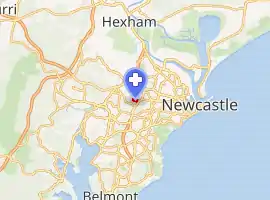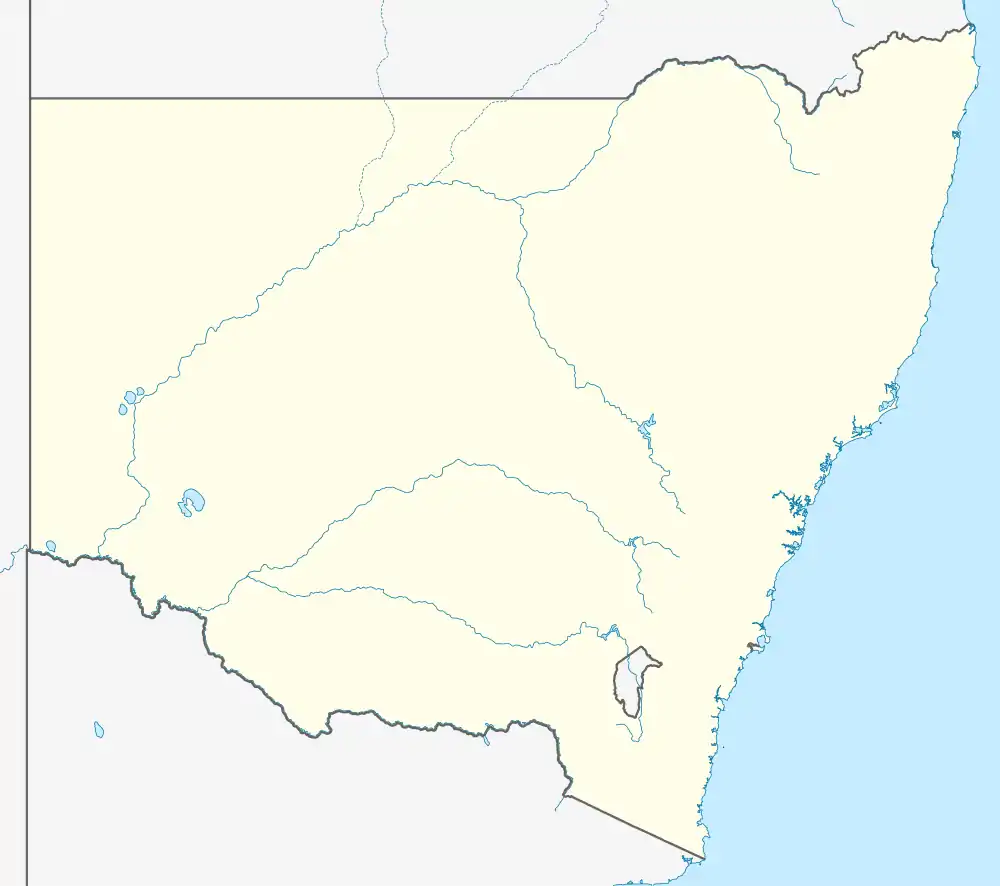John Hunter Hospital
The John Hunter Hospital and John Hunter Children's Hospital (sometimes known as the JHH and JHCH respectively, or more colloquially The John Hunter) is the principal referral centre and a tertiary hospital for Newcastle, and northern New South Wales, Australia. The 796 bed hospital is the main teaching hospital of the University of Newcastle. The hospital contains the only trauma centre in New South Wales outside the Sydney Metropolitan Area, and has the busiest emergency department in the state.[1] John Hunter is the busiest trauma hospital in the state, and the second-busiest in the country behind The Alfred Hospital in Victoria .
| John Hunter Hospital | |||||||||||
|---|---|---|---|---|---|---|---|---|---|---|---|

| |||||||||||
 | |||||||||||
| Geography | |||||||||||
| Location | New Lambton Heights, New South Wales, Australia | ||||||||||
| Coordinates | 32.9225°S 151.6930°E | ||||||||||
| Organisation | |||||||||||
| Care system | Public Medicare (AU) | ||||||||||
| Funding | Public hospital | ||||||||||
| Type | Teaching | ||||||||||
| Affiliated university | University of Newcastle | ||||||||||
| Services | |||||||||||
| Emergency department | Yes | ||||||||||
| Beds | 550 (796 inclusive of JHCH and Royal Newcastle Centre) | ||||||||||
| Helipads | |||||||||||
| Helipad | (ICAO: YXJH) | ||||||||||
| |||||||||||
| History | |||||||||||
| Opened | 25 May 1991 Nick Greiner Premier of New South Wales | ||||||||||
| Links | |||||||||||
| Website | John Hunter Hospital John Hunter Children's Hospital | ||||||||||
| Lists | Hospitals in Australia | ||||||||||
Overview
The John Hunter health complex consists of 796 beds in total, and is co-located next to the 174 bed Newcastle Private Hospital, as well as the regional Hunter Area Pathology Service which provides tertiary level pathology testing. The complex consists of a single building, which is divided into 694 adult beds and another 126 paediatric beds in the John Hunter Children's Hospital.
The Royal Newcastle Centre (formerly Royal Newcastle Hospital), opened as an extension wing to the John Hunter Hospital in April 2006, providing 144 of these beds. Patients from the Hunter Region and beyond are referred to John Hunter for treatment in a range of specialities. The John Hunter Children's Hospital and Royal Newcastle Centre are located within the same building as the John Hunter Hospital. Also on the same grounds are Rankin Park Hospital (Rehab), Newcastle Private Hospital and the Hunter Medical Research Institute (HMRI).
John Hunter Hospital is named for Vice Admiral John Hunter, the second Governor of NSW.
Specialty Services Provided
The JHH and JHCH are tertiary level hospitals, and provide the following specialties and subspecialties:
| Specialty | Details |
|---|---|
| Anaesthesia | including sub-specialties in Cardiac, Neuro, Obstetric, Paediatric & Regional anaesthesia as well as Pain Medicine (both Acute and Chronic Pain services are available) |
| Intensive Care | The 37 bed Intensive Care complex provides both Adult and Paediatric ICU. The 29 bed Adult ICU provides of General Medical, General Surgical, Cardiac, Trauma & Neurosurgical Intensive Care.
The ICU is able to provide advanced respiratory support for severe respiratory failure including invasive ventilation, non-invasive ventilation, high frequency oscillation ventilation, proning, and VV-ECMO. Haemodynamic support available includes vasopressor and inotropic support, advanced haemodynamic monitoring, echocardiography, continuous renal replacement therapy, intra-aortic balloon pump and VA-ECMO. Neurocritical care includes EVD pressure monitoring, continuous EEG monitoring, transcranial Doppler. |
| Paediatric Intensive Care | The newly built 8 bed PICU was opened in 2017 and is one of 3 tertiary PICUs in the state. Currently funded for 4 beds, and provides non-invasive and invasive ventilator support as well as haemodynamic support. |
| Neonatal Intensive Care | 18 NICU and 24 Special care beds, providing care for children born as early as 23 weeks gestation. |
| Retrieval Medicine | The Hunter New England Aeromedical Retrieval Service provides both primary (pre-hospital) and secondary (inter-hospital) adult and paediatric retrieval services. Doctors from Anaesthesia, Intensive Care and Emergency provide the medical staff, whilst ICU nurses provide nursing support for secondary retrievals. The secondary retrieval service is led by the on-call intensive care specialist. |
| Emergency medicine | Providing tertiary adult and paediatric emergency care |
| Trauma | The JHH and JHCH is the busiest trauma centre in the state and the second busiest nationally. It has a dedicated trauma surgical team as well as utilising the expertise of sub-specialty surgeons when required. |
| Surgical Specialties |
General Surgery |
| Medical Specialties |
General Medicine |
| Obstetrics and Gynaecology | Including Gynae-oncology and high risk maternal-fetal medicine unit |
| Radiology | Xrays, CT, MRI, Nuclear medicine and interventional radiology including embolization. |
| Psychiatry | Both adult and paediatric psychiatry services are provided, both in-hospital and community. |
Wards
The John Hunter Hospital and John Hunter Children's Hospital consists of the following ~30 bed wards. Wards are designated by their horizontal position along the hospitals long corridor (by letter) and the number indicates which level of the hospital the ward is on (Levels 1–3). Hence ward E3 is positioned above E2 and next door to ward F3.
- Ward E1: Rehabilitation
- Ward E2: Urology/Rheumatology
- Ward E3: Orthopaedics
- Ward F1: Orthopaedics
- Ward F2: Immunology/Respiratory/General Medicine
- Ward F3: Cardiovascular
- Ward G1: General Medicine
- Ward G2: Neurology/Neurosurgery
- Ward G3: Cardiology/Gastroenterology
- Ward H1: Children's Medical
- Ward H2: Emergency Short Stay Unit/Medical Assessment and Coordination Unit
- Ward H3: Special Surgery/Trauma
- Ward J1: Children's Surgical and Oncology
- Ward J2: Adolescent, Day Stay and Sleep Unit
- Ward J3: General Surgery
- Ward K1: Nephrology/Dialysis
- Ward K2: Maternity/Post-Natal
- Ward K3: Gynaecology/Gynaecology Oncology
- AGSU: Acute General Surgical Unit
- CCU: Coronary Care Unit
- ED: Emergency Department
- Transplant: Transplant
- ICU/HD: Intensive Care Unit/High Dependency Unit
- PICU: Paediatric Intensive Care Unit
- NICU: Neonatal Intensive Care Unit
- NEXUS: Adolescent Mental Health
Origin of name
A unique aspect of the John Hunter Hospital is the reasoning behind its name. Rather than being named after one person, the JHH is named in honour of three men, all of whom were called John Hunter. They were:
- John Hunter, a former governor of New South Wales and the namesake of the whole Hunter region
- John Hunter, the famed 18th-century surgeon and pioneer of anatomical pathology, and
- John Irvine Hunter, an Australian anatomist who died in 1924 at the age of 26, having already been appointed the youngest anatomy professor at the University of Sydney
References
- "John Hunter Hospital". Hunter New England Area Health Service. Archived from the original on 20 August 2010. Retrieved 28 October 2010.